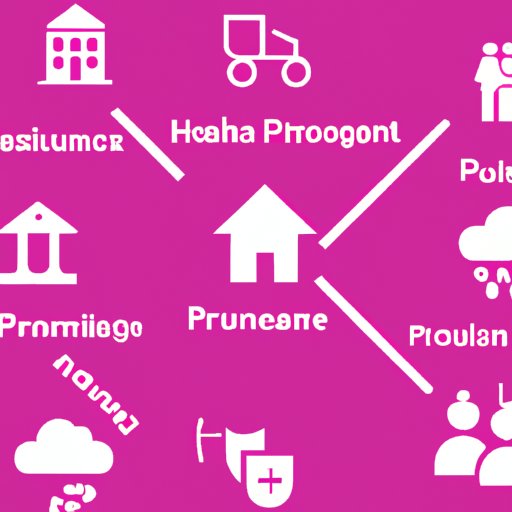Introduction
Public health is a broad field that encompasses many different aspects of health and well-being. It is concerned with the prevention of illness and injury, the promotion of health and well-being, and the protection of individuals and communities from disease, disability, and premature death. As such, it is an essential part of every society and has a direct impact on the overall quality of life.

Exploring the Basics of Public Health: An Overview
Public health is a multidisciplinary field that draws upon research and expertise from many different areas, including epidemiology, biostatistics, health services administration, environmental health, nutrition, behavioral sciences, and more. It is a broad field that includes both the prevention of disease and the promotion of health and well-being.
At its core, public health is concerned with the prevention of illness and injury, the promotion of health and well-being, and the protection of individuals and communities from disease, disability, and premature death. This is accomplished through a variety of means, including preventive medicine, health education, and environmental protection. The goal of public health is to improve the health of all individuals, regardless of their age, gender, race, or socio-economic status.
The role of prevention in public health is critical. By focusing on preventing diseases before they occur, public health professionals can help reduce the burden of illness and injury on individuals and communities. This includes measures such as immunizations, screenings for early detection of diseases, and education about healthy lifestyle choices.

Examining How Public Health Impacts Our Lives
Public health has a direct impact on our lives in several ways. It affects our physical health and well-being, our society, and our economy.
On an individual level, public health can have a profound effect on our health and well-being. By promoting preventive measures such as immunizations and screenings, public health professionals can help reduce the incidence of infectious and chronic diseases. In addition, public health initiatives such as smoking cessation campaigns and nutrition education can help reduce the risk of lifestyle-related illnesses.
At the societal level, public health can have a significant impact. Public health initiatives such as immunization campaigns, mental health awareness campaigns, and disease surveillance systems can help to reduce the spread of infectious diseases and improve the overall health and well-being of a community. In addition, public health initiatives can help to reduce disparities in health outcomes between different groups of people.
Finally, public health has an effect on the economy. By reducing the burden of illness and injury, public health efforts can help to reduce health care costs, improve productivity, and increase economic growth. Additionally, public health initiatives can help to create jobs in the health care sector and spur innovation in health care technologies.

Investigating the Role of Government in Public Health
The government plays an important role in public health. Through legislation, funding, and regulations, the government helps to ensure that public health initiatives are effective and accessible to all.
Legislation is an important tool to ensure that public health initiatives are implemented and enforced. Laws can be used to regulate the production and sale of food and drugs, require safety standards in workplaces, and mandate vaccinations.
In addition to legislation, the government provides funding for public health initiatives. These funds are often used to support research, develop new treatments, and implement preventive measures.
Finally, the government establishes regulations to ensure that public health initiatives are carried out effectively and safely. These regulations can include standards for food safety, water quality, and air quality.
A Closer Look at the Challenges Faced by Public Health Professionals
Public health professionals face a number of challenges in their work. These include limited resources, political pressure, and social stigma.
One of the biggest challenges facing public health professionals is limited resources. Despite the fact that public health initiatives can have a significant impact on health and well-being, many areas lack adequate funding to carry out these initiatives. This can lead to inadequate staffing and infrastructure, which can limit the effectiveness of public health programs.
In addition, public health professionals often face political pressure. Politicians may be reluctant to support public health initiatives due to concerns over cost or public opinion. This can make it difficult for public health professionals to implement their programs.
Finally, public health initiatives can sometimes face social stigma. Many people view public health initiatives as intrusive or unnecessary. This can lead to a lack of public support and make it difficult for public health professionals to achieve their goals.
Exploring the Benefits of Public Health Programs
Despite the challenges faced by public health professionals, there are numerous benefits associated with public health initiatives. These include improved quality of life, cost savings, and increased access to care.
Public health initiatives can have a positive impact on quality of life. For example, immunization campaigns can help to reduce the incidence of infectious diseases, while smoking cessation campaigns can reduce the risk of lung cancer. In addition, public health initiatives such as nutrition education and physical activity campaigns can help to reduce the risk of lifestyle-related illnesses.
Public health initiatives can also have a positive economic impact. By reducing the burden of illness and injury, public health programs can help to reduce health care costs. Additionally, public health initiatives can help to create jobs in the health care sector and spur innovation in health care technologies.
Finally, public health initiatives can help to increase access to care. By increasing awareness of health issues and providing preventive measures, public health initiatives can help to reduce barriers to health care. This can help to ensure that all individuals have access to the care they need.
Conclusion
Public health is a complex field that has a direct impact on our lives. Through preventive measures, health education, and environmental protection, public health professionals can help to reduce the burden of illness and injury and promote health and well-being. The government plays an important role in public health, through legislation, funding, and regulations. Despite the challenges faced by public health professionals, public health initiatives can have a positive impact on quality of life, cost savings, and access to care.
It is clear that public health is an essential part of every society and has a direct impact on the overall quality of life. We must continue to invest in public health initiatives in order to ensure that everyone has access to the care they need and to promote health and well-being in our communities.
(Note: Is this article not meeting your expectations? Do you have knowledge or insights to share? Unlock new opportunities and expand your reach by joining our authors team. Click Registration to join us and share your expertise with our readers.)
